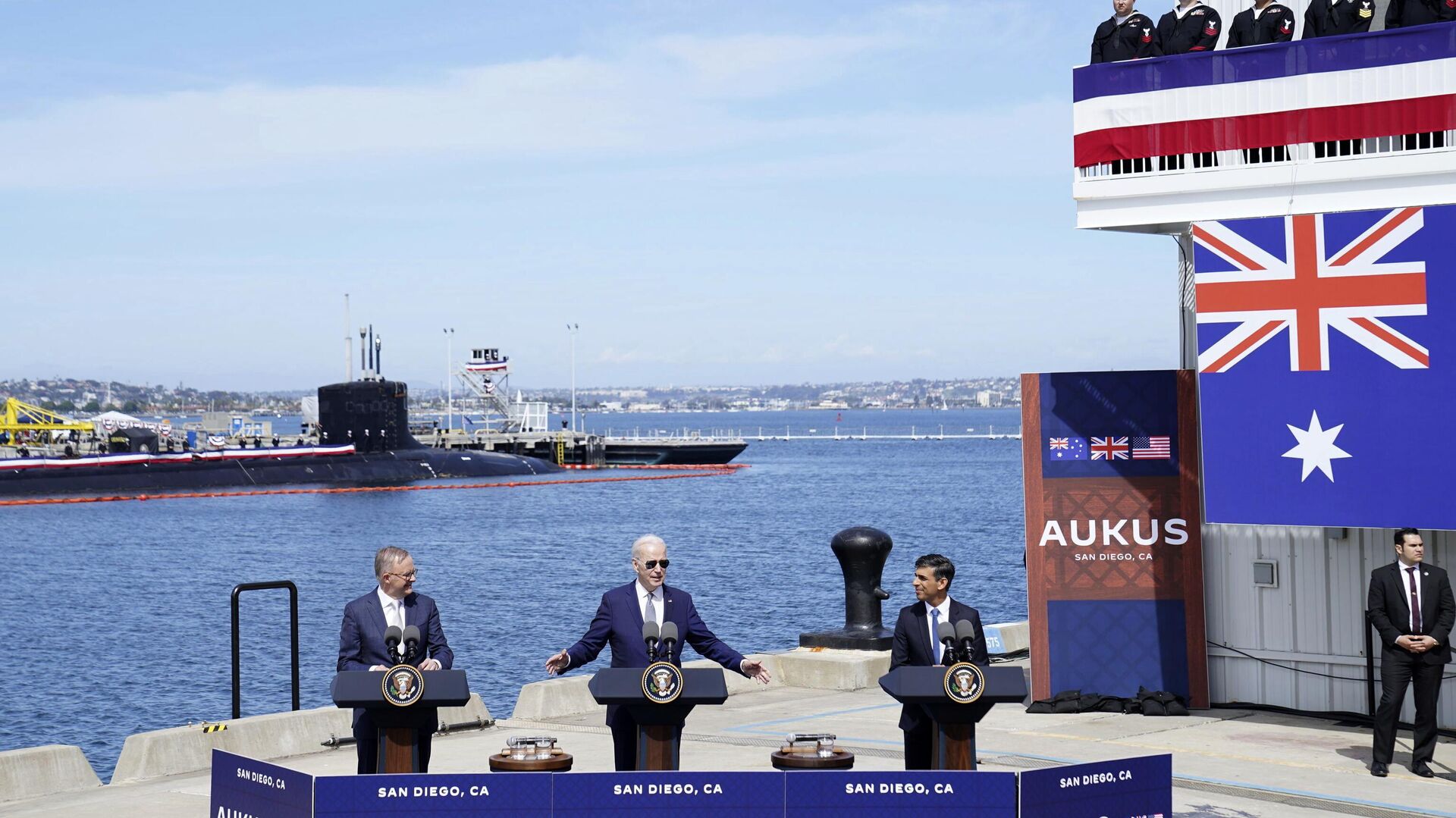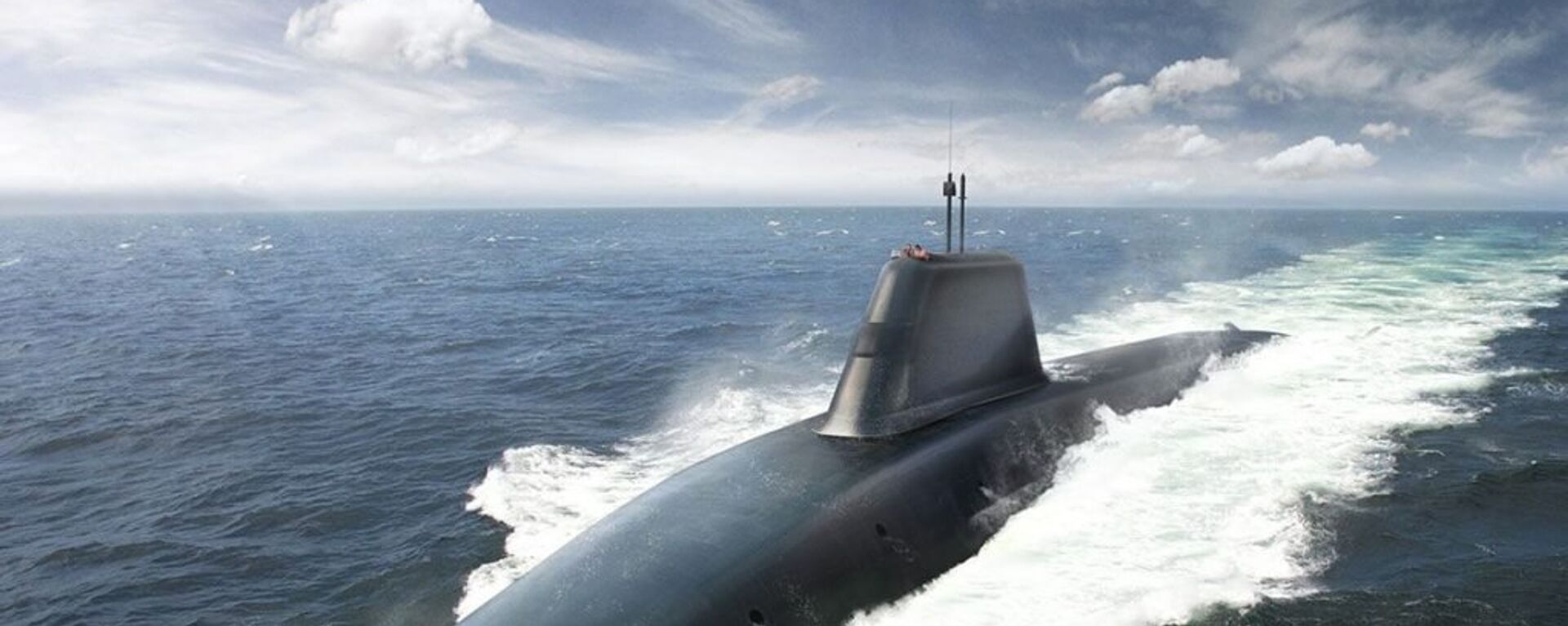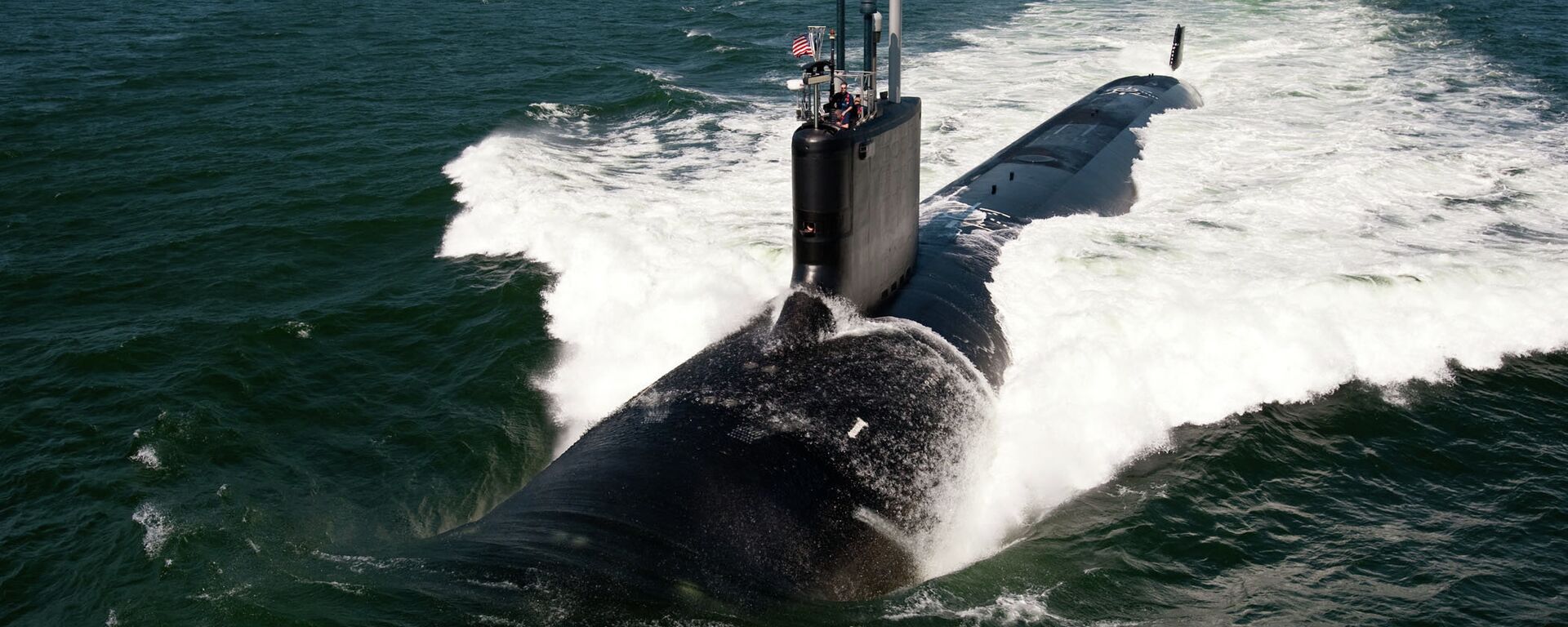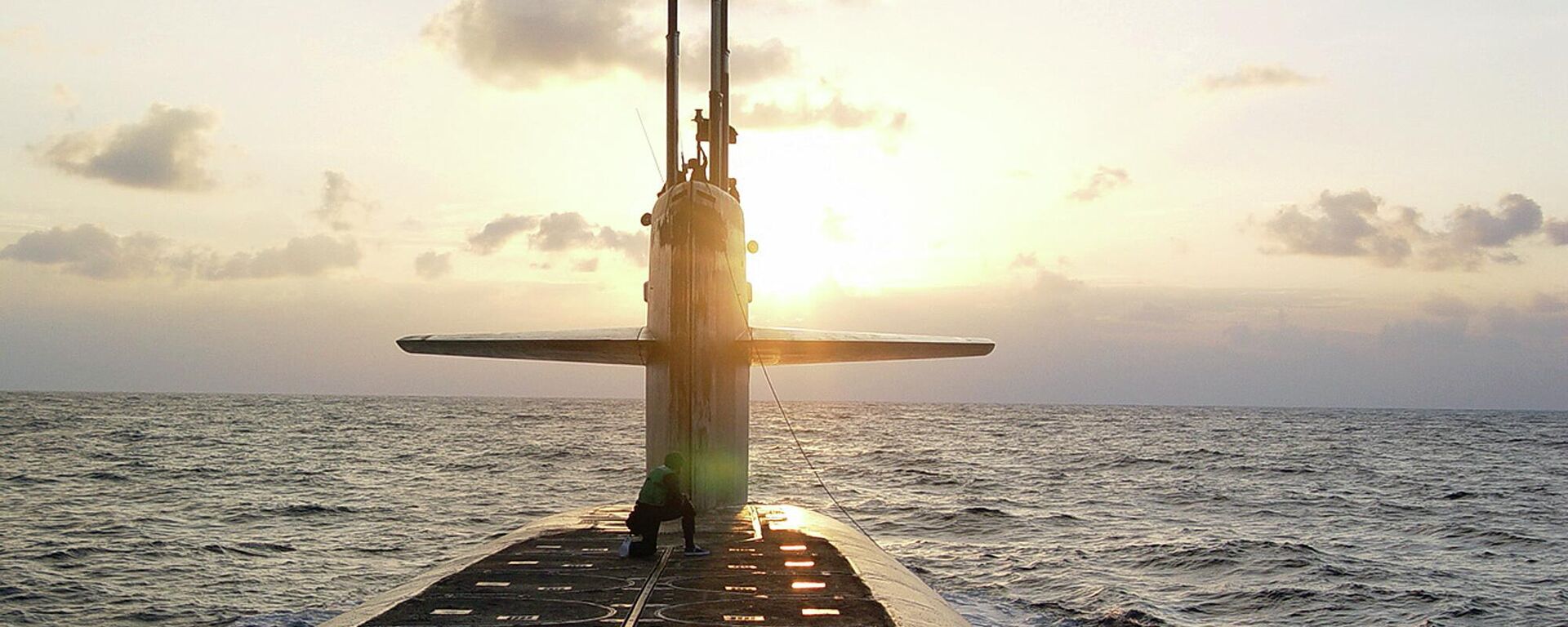https://sputnikglobe.com/20240407/aukus-to-push-forward-with-expansion-despite-quarrels-between-allies-1117790806.html
AUKUS to Push Forward With Expansion Despite Quarrels Between Allies
AUKUS to Push Forward With Expansion Despite Quarrels Between Allies
Sputnik International
Defense ministers of the US, UK and Australia are set to announce on Monday the start of talks on new members joining the AUKUS security pact, reported the Financial Times.
2024-04-07T11:05+0000
2024-04-07T11:05+0000
2024-04-07T11:05+0000
world
us
joe biden
japan
aukus
australia
united kingdom (uk)
fumio kishida
china
https://cdn1.img.sputnikglobe.com/img/07e8/04/07/1117790403_0:161:3069:1887_1920x0_80_0_0_23400c40ff1aa00fe3fc3abca5207464.jpg
The US is pushing for Japan to be included in Pillar II of the AUKUS agreement, despite disagreements that have plagued the trilateral pact, the Financial Times reported.The defense ministers of the United States, Britain and Australia are expected to issue a statement on Monday announcing the start of talks on new members joining the security pact. The talks would be on the non-nuclear Pillar II of the trilateral security agreement, insiders were quoted as saying. Expansion of Pillar I is not on the table, they added.The statement comes ahead of a meeting between US President Joe Biden and Japanese Prime Minister Fumio Kishida at the White House on April 10. The two sides are expected to announce closer military cooperation as Japan's prime minister pushes a massive defense buildup rationalized by US-driven claims of alleged threats from neighboring countries. A trilateral meeting between the US, Japan and the Philippines will follow on Thursday.Pillar II involves the sharing of a range of technologies, including underwater robotics, quantum electronics, cybersecurity and electronic warfare capabilities, hypersonic weapons, and defenses against them.Under the three-phase deal, Australia is expected to buy at least three Virginia-class nuclear-powered attack submarines, with an option to acquire two more in the early 2030s. Before that, Canberra would host the "rotational force" of US and British submarines from 2027. In December 2023, the US Congress passed the National Defense Authorization Act, which authorized the transfer of the Virginia-class submarines to Australia.From the beginning, there has been talk of other countries joining the Pillar II of AUKUS, with Japan being dubbed "Jaukus" for its potential membership. US Ambassador to Tokyo Rahm Emanuel wrote in the Wall Street Journal on Friday that Japan was "about to become the first additional Pillar II partner" in AUKUS.A Politico report in March quoted diplomats as saying that the Biden administration was "pushing really hard to get some things on AUKUS pillar 2 done now, before the US election" in November. The rush was apparently prompted by fears that if ex-President Donald Trump retook the White House, he might decide to either roll back or scrap the AUKUS agreement.But the upcoming announcement on the possible expansion is a "compromise between the allies," the outlet noted. Both Australia and the UK have reportedly balked at the idea of inviting Japan to join AUKUS. As it stands, the trilateral security cooperation pact faces complications that need to be ironed out, the report read.Australian Defense Minister Richard Marles indicated in February that AUKUS was "very much focused on working on new innovative technologies amongst the three countries" before any new members joined.US Deputy Secretary of State Kurt Campbell admitted that the US side was finding it "challenging to trilateralize" some of the development and co-production with the UK and Australia.Canberra and London have also previously raised concerns about Tokyo's lack of security systems to protect highly sensitive information. "Japan has taken some of those steps, but not all of them," Campbell stated.As for Australia, it sees the nuclear submarine program as a priority before expanding Pillar II, an insider was quoted as saying.As the Washington architects of this de facto anti-China alliance show an eagerness to expand it, with reports suggesting South Korea or New Zealand as likely candidates, opposition to the pact has grown. From the outset, China has denounced AUKUS as a demonstration of a "Cold War mentality." AUKUS could turn the Pacific into "an ocean of storms," Chinese Foreign Ministry spokesman Wang Wenbin warned last year.Russia expressed concern about the pact, saying the partnership would have a destabilizing effect on the Nuclear Non-Proliferation Treaty (NPT) and undermine international security in general.Incidentally, with respect to Pillar II, the Australian Strategic Policy Institute's (ASPI) June 2023 assessment update suggests that China is ahead of the US and its allies in 19 of the 23 technologies relevant to that stage of AUKUS."China has become a serious competitor in the foundational technologies of the 21st century: artificial intelligence (AI), 5G, quantum information science (QIS), semiconductors, biotechnology, and green energy," as per the statement.
https://sputnikglobe.com/20240320/biden-admin-pushing-hard-to-get-aukus-pillar-2-deals-with-japan-canada---report-1117445259.html
https://sputnikglobe.com/20230607/why-aukus-nuclear-sub-deal-will-stir-up-pacific-into-ocean-of-storms-1110982350.html
https://sputnikglobe.com/20240319/nz-flirts-with-aukus-pillar-ii-amid-chinese-concerns-1117419798.html
japan
australia
united kingdom (uk)
china
Sputnik International
feedback@sputniknews.com
+74956456601
MIA „Rossiya Segodnya“
2024
News
en_EN
Sputnik International
feedback@sputniknews.com
+74956456601
MIA „Rossiya Segodnya“
Sputnik International
feedback@sputniknews.com
+74956456601
MIA „Rossiya Segodnya“
us, uk and australia to announce talks on new members joining aukus, what is aukus security pact, japan may join non-nuclear ii pillar of the trilateral aukus security partnership, what is pillar 2 of aukus, will aukus expand, who may join aukus, aukus nuclear submarine deal, australia gets nuclear materials, non-nuclear asean, china aukus non-proliferation concerns, ssn aukus, us-australia technology sharing, nuclear technology, arms race in indo-pacific, nuclear arms race in indo-pacific, aukus, a trilateral pact between australia, the us and the uk,
us, uk and australia to announce talks on new members joining aukus, what is aukus security pact, japan may join non-nuclear ii pillar of the trilateral aukus security partnership, what is pillar 2 of aukus, will aukus expand, who may join aukus, aukus nuclear submarine deal, australia gets nuclear materials, non-nuclear asean, china aukus non-proliferation concerns, ssn aukus, us-australia technology sharing, nuclear technology, arms race in indo-pacific, nuclear arms race in indo-pacific, aukus, a trilateral pact between australia, the us and the uk,
AUKUS to Push Forward With Expansion Despite Quarrels Between Allies
Earlier reports had indicated that the administration of US President Joe Biden was pushing hard to gain momentum on the AUKUS Pillar 2 stage before the US elections in November. It was also noted that Japan and Canada were in line to join the second - non-nuclear - pillar of the trilateral security partnership.
The US is pushing for Japan to be included in
Pillar II of the
AUKUS agreement, despite disagreements that have plagued the trilateral pact, the Financial Times reported.
The defense ministers of the United States, Britain and Australia are expected to issue a statement on Monday announcing the start of talks on new members joining the security pact. The talks would be on the non-nuclear Pillar II of the trilateral security agreement, insiders were quoted as saying. Expansion of Pillar I is not on the table, they added.
The statement comes ahead of a meeting between US President Joe Biden and Japanese Prime Minister Fumio Kishida at the White House on April 10. The two sides are expected to announce closer
military cooperation as Japan's prime minister pushes a massive defense buildup rationalized by US-driven claims of alleged threats from neighboring countries. A trilateral meeting between the US, Japan and the Philippines will follow on Thursday.
Pillar II involves the sharing of a range of technologies, including underwater robotics, quantum electronics, cybersecurity and electronic warfare capabilities, hypersonic weapons, and defenses against them.
Announced on September 15, 2021, the AUKUS trilateral partnership between the United States, United Kingdom, and Australia promised to bolster Australia's fleet with nuclear-powered submarines and increase defense cooperation among countries in the Asia-Pacific region. The deal led to a diplomatic rift between Australia and France after Canberra reneged on a $66 billion contract with Paris to develop 12 advanced conventionally powered attack submarines.
Under the three-phase deal, Australia is expected to buy at least three Virginia-class
nuclear-powered attack submarines, with an option to acquire two more in the early 2030s. Before that, Canberra would host the "rotational force" of US and British submarines from 2027. In December 2023, the US Congress passed the
National Defense Authorization Act, which
authorized the transfer of the Virginia-class submarines to Australia.
From the beginning, there has been talk of other countries joining the Pillar II of AUKUS, with Japan being dubbed "Jaukus" for its potential membership. US Ambassador to Tokyo Rahm Emanuel wrote in the Wall Street Journal on Friday that Japan was "about to become the first additional Pillar II partner" in AUKUS.
A Politico report in March
quoted diplomats as saying that the Biden administration was "pushing really hard to get some things on AUKUS pillar 2 done now, before the US election" in November. The rush was apparently prompted by fears that if ex-President Donald Trump retook the White House, he might decide to either roll back or scrap the AUKUS agreement.
But the upcoming announcement on the possible expansion is a "compromise between the allies," the outlet noted. Both Australia and the UK have reportedly balked at the idea of inviting Japan to join AUKUS. As it stands, the trilateral security cooperation pact faces complications that need to be ironed out, the report read.
Australian Defense Minister Richard Marles indicated in February that AUKUS was "very much focused on working on new innovative technologies amongst the three countries" before any new members joined.
US Deputy Secretary of State Kurt Campbell admitted that the US side was finding it "challenging to trilateralize" some of the development and co-production with the UK and Australia.
Canberra and London have also previously raised concerns about Tokyo's lack of security systems to protect highly sensitive information. "Japan has taken some of those steps, but not all of them," Campbell stated.
As for Australia, it sees the nuclear submarine program as a priority before expanding Pillar II, an insider was quoted as saying.
As the Washington architects of this de facto anti-China alliance show an eagerness to expand it, with reports suggesting South Korea or New Zealand as likely candidates, opposition to the pact has grown. From the outset, China has denounced AUKUS as a demonstration of a "Cold War mentality." AUKUS could turn the Pacific into "an ocean of storms," Chinese Foreign Ministry spokesman Wang Wenbin warned last year.
Russia expressed concern about the pact, saying the partnership would have a destabilizing effect on the Nuclear Non-Proliferation Treaty (NPT) and undermine international security in general.
Incidentally, with respect to Pillar II, the Australian Strategic Policy Institute's (ASPI) June 2023
assessment update suggests that
China is ahead of the US and its allies in 19 of the 23 technologies relevant to that stage of AUKUS."China has become a serious competitor in the foundational technologies of the 21st century: artificial intelligence (AI), 5G, quantum information science (QIS), semiconductors, biotechnology, and green energy," as per the statement.





